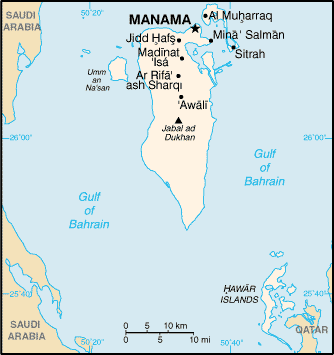|
Bahrain
The Kingdom of Bahrain, or Bahrain (formally spelled Bahrein), is a borderless island nation in the Persian Gulf (Southwest Asia/Middle East, Asia). Saudi Arabia is to the west and is connected to Bahrain by the King Fahd Causeway, and Qatar is to the south across the Persian Gulf. The Qatar-Bahrain Friendship Bridge, currently in planning, will link Bahrain to Qatar as the longest fixed link in the world. Bahrain has been populated by humans since prehistoric times. Its strategic location in the Persian Gulf has brought rule and influence from the Assyrians, Babylonians, Greeks, Persians, and finally the Arabs, under whom the island became Muslim. Bahrain was in the ancient times known as Dilmun, Tylos (its Greek Given name), Awal, as well as Persian name Mishmahig when it was a part of the Persian Empire. The islands of Bahrain, positioned in the middle south of the Persian Gulf, have attracted the attention of many invaders in history. Bahrain, meaning "Two Seas" refers to the fact that the islands contain the two sources of water, sweet water springs and salty water in the surrounding seas. A strategic position between East and West, fertile lands, fresh water, and pearl diving made Bahrain a centre of urban settlement throughout history. Some 2300 years BC, Bahrain became a centre of one of the ancient empires trading Mesopotamia (now Iraq) and the Indus Valley (now the region near India). This was the civilization of Delmon that was linked to the Sumerian Civilization in the third millennium BC. Bahrain also became part of the Babylon empire about 600 BC. Historical records referred to Bahrain the "Life of Eternity", "Paradise", etc. Bahrain was also called the "Pearl of the Persian Gulf". Bahrain up until 1521 comprised the bigger region of Ahsa, Qatif (both are now the eastern province of Saudi Arabia) as well as Awal (now Bahrain Islands). The region stretched from what is now Kuwait to Oman. This was Iqlim Al-Bahrain (Province of Bahrain). In 1521, the Portuguese separated Awal (now Bahrain) from the rest and since then the name of Bahrain specifically referred to today's Bahrain. The modern history of Bahrain begins with increasing British involvement in the region, aimed at isolating Iran. The British provided support to the Al-Khalifa family, who established a power base in the island and built alliances with the British in order to separate the island from Iran. The British gained free access to the Persian Gulf through this agreement. In November of 1957, the Iranian parliament unilaterally decreed Bahrain as the Fourteenth Province of Iran. Later the British would directly become involved in the politics of Bahrain by handpicking an Emir of the island. Eventually Iran and Britain agreed that the matter of Dominion of Bahrain would be put to international judgment and requested the United Nations General Secretary to take on this responsibility. In a Plebiscite to decide the country's future, the majority of the population of Bahrain chose to reject Iran's claims, and to define themselves, as well as their culture to be Arabic, and not Persian. Oil was discovered in the early 20th century and brought rapid modernization and improvements to Bahrain. It also made relations with Britain tighter, and this was evidenced by the British moving more bases to the island nation. British influence would continue to grow, culminating with the appointment of Charles Belgrave as an advisor; Belgrave established modern education systems in Bahrain. After World War II, increasing anti-British feeling spread throughout the Arab world and led to some riots in Bahrain. The British withdrew from Bahrain in 1971, making it an independent emirate. The oil boom of the 1980s greatly benefitted Bahrain, but its downturn was not as badly felt, as the economy of Bahrain began to diversify. In 1994, a wave of rioting by disaffected Shia Islamists was touched off after women athletes participated in a marathon race. The Kingdom was badly affected by sporadic violence during the mid-1990s in which over forty people were killed. In 1999, Sheikh Hamad bin Isa Al Khalifa succeeded his father as head of state and instituted elections for parliament, gave women the vote and released all political prisoners. This article is licensed under the GNU Free Documentation License. It uses material from the Wikipedia article "Bahrain". |
||||||||||||
 Map Courtesy CIA World Factbook
Map Courtesy CIA World Factbook